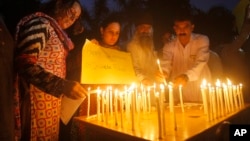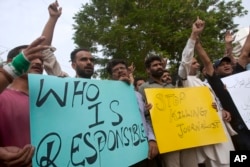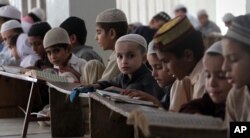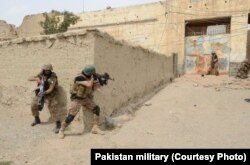The Pakistani government says it wants to introduce a new counter-extremism policy. But as Monday’s bombing in Quetta shows, Pakistan has a long way to go to stop the carnage that has plagued the country, analysts say.
“A new counterterrorism policy in Pakistan would be a good thing, but I worry it could just be window dressing that papers over the broader problem,” Michael Kugelman, senior researcher at the Woodrow Wilson Center, told VOA.
Kugelman said that the militant extremism problem would not end if Pakistan continues to “refuse to crack down on all forms of terrorism and all forms of terrorist groups.”
Pakistan’s National Counter-terrorism Authority (NACTA), which monitors and proposes counter-extremism strategies, is in the process of forming a new national counter-extremism policy in the country, officials said. “A national counter-extremism policy will be introduced within two months,” NACTA chief officer, Ehsan Ghani told VOA.
School reforms
According to Ghani, the policy will propose new laws as well as amendments to some existing laws in the country. It would also propose reforms in the education sector, including the widespread Madrassa system, to change the “mindset” in the country so the people be tolerant.
But Peshawar-based defense analyst Saad Mohammad Khan, a retired military leader, said the new laws and policies cannot be effective if they are not properly enforced.
“Extremism is everywhere in the society,” Khan added in the interview with VOA. “It is present in our houses, in our schools, offices, market...”
Khan said that unless the entire education system is overhauled, extremist views would be nurturing even in the mainstream and secular schools.
“Children are taught that we [Pakistanis] are better human beings than others, and that other people [nations] are anti-Islam,” Khan told VOA. “When those children grow up, most are paranoid which leads them towards extremism."
According to Khan, prominent members of the ruling Muslim League, which is not an Islamist party, have shown opposition to changing the current curriculum in Pakistani schools.
Experts say many madrassas in Pakistan have been a source of militancy in both Pakistan and in neighboring Afghanistan.
The Khyber Pakhtunkhwa provincial government was scathingly criticized last month for a $3 million grant it recently allocated to Darul Uloom Haqqania madrassa, a controversial Islamic seminary that some critics call the “University of Jihad.”
Taliban sympathies
Headed by former senator Samiul Haq, the madrassa houses about 4,000 students and is widely known for links to, and publicly expressed sympathies for, the Taliban who are fighting local and U.S.-led international forces in Afghanistan. That association has won the Islamic cleric the title of “Father of the Taliban.”
“You also have an environment in Pakistan that enables extremism,” said Kugelman. “Networks of religious institutions and clerics as well as powerful victimization narratives that fuel the hardline ideologies that allow militancy to thrive.”
“I cannot imagine a new counterterror policy would do much to address this. The bottom line is that killing terrorists will not make terrorism go away,” Kugelman said.
Anti-terror chief Ghani told VOA that under the government’s National Action Plan, an action plan established in January 2015 to crackdown on terror networks in Pakistan, the government has taken a number of stern actions to counter extremism, including the closure of “98.4 million unregistered cellphone sim cards” in the country. He acknowledged, however, that a number of terror and banned group leaders still appear on television channels in Pakistan to further their agenda.
US military aid
In Washington, the Pentagon has withheld $300 million in military aid to Pakistan because of insufficient action by Pakistan against the Haqqani terrorist network.
“The U.S. congress has shown that it is unhappy with Pakistan’s continuing support for groups like the Haqqani network that continues to fight Afghan and the U.S. forces in Afghanistan. And we saw that with the blocking of the U.S. government funding for F-16s sale to Pakistan,” Lisa Curtis, a senior researcher at the Washington-based Heritage Foundation, told VOA.
Curtis said that ongoing Pakistan military operations against militants in the tribal region has reduced violence in Pakistan but other militant groups should be targeted too.
“The Zarb-e-Azb operation has reduced violence in Pakistan but the U.S. also has concerns about other militant groups operating in the region and there are disagreements on these issues between Washington and Islamabad,” Curtis said. “There will be a change… The frustration will grow. Whoever is the next U.S. president, it is likely to develop tougher policies towards Pakistan and demand more changes with regard to its policies toward Taliban.."
Pakistan denies the allegations, saying it does not distinguish between “good and bad” militants. “We have taken decisive action against terrorists and extremists and also cooperate widely with other countries to defeat it,” said Pakistan’s Foreign Ministry spokesperson Nafees Zakaria.







